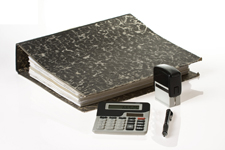Last updated: Nov. 2, 2016
Small businesses are the backbone of the Canadian economy. In fact, 97.9% of businesses in Canada are small businesses.
No matter where you live in Canada, as a small business owner, you understand that it’s hard work running a business.
One area that unfortunately can get neglected in the running of your small business is bookkeeping and maintaining financial records.
There are many strategies you can use to ensure your small business finances are in order. They will not only help keep your business run smoothly, but they can also help you stay on the right side of the Canada Revenue Agency (CRA).
Use Proper Accounting Methods
What’s the best way to keep your books and records in order?
There is no one right way. But whether you go it alone or hire someone, you need to keep your records organized.
Organized books can help you:
- Track your progress and compare past and present financial positions
- Plan and forecast future financial positions
- Provide information to make sound business decisions
- Satisfy reporting obligations to the CRA, and save time and energy should your small business get audited
Plan and Track Major Expenses
Chances are good that you want your small business to grow. That will mean spending money.
Take a look around and ask yourself what expenses will be coming up in the next one to five years.
Will you need a new computer, printer, or other office equipment? Are you going to be looking for a bigger office or different setting?
Taking stock of future expenses will help you budget and avoid spending money in slow periods.
Expenses can be difficult to track. Without a comprehensive understanding of CRA tax rules, you could be missing out on tax write-offs that you are otherwise entitled to and could have benefited from.
Business credit cards are a great way to keep your personal and business lives separate, and ensure that all your business expenses are kept together and tracked.
For additional backup, make notes in your calendar about business expenses and events. That goes for car mileage too.
When running a small business, you need to keep your business records (paper or electronic, payroll deductions, taxes collected and paid) for six years from the end of the last tax year.
Record all Deposits
Big or small: record it.
Over the course of a year, you’re going to be making several deposits into your account. From loans to sales, you need to keep track of everything being deposited into your business bank account.
Being unable to account where each deposit comes from means you might have to pay taxes on money that isn’t income.
Take Care of Taxes
When you’re a small business owner, you’re the one in charge of the bookkeeping and all financial records—and paying taxes.
Set money aside for your taxes throughout the year. Remember, unpaid taxes can incur penalties and interest from the CRA. By setting aside money each month, or each time a contract is paid, you will be in a better position when taxes are due.
The Importance of Bookkeeping and Records Management
As a successful small business owner, it’s imperative that you take your bookkeeping and records management seriously.
One of the main reasons why small businesses fail is not necessarily a lack of money; it’s that the owners have a poor understanding of money management.
For starters, business and pleasure do not mix. One big mistake small business owners make is mixing their business and personal finances together.
Even if you’re running a one-person business out of the basement of your home, have a separate bank account, credit card, and cheques to manage your finances.
Second, a business can be making serious profits, but if the cash flow is not managed properly it can easily go under. This is one of the reasons why 30% of small businesses in Canada don’t make it beyond two years.2
Small business owners can help avoid this fate by understanding the basics of bookkeeping and managing finances.
FBC, Helping Small Business Keep Their Finances in Order
Bookkeeping and accounting are an important part of running a small business. Hiring a tax consultant like FBC can be very beneficial to small business owners as FBC can help answer all of your questions about bookkeeping and financial records.
For more information on how FBC tax specialists can help your small business with its bookkeeping, accounting, income tax preparation and financial planning call us today at 1-800-265-1002 or submit an online form and a FBC tax specialist will contact you at your earliest convenience.
